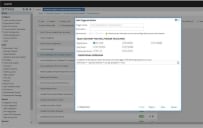Configuring Mobile Notifications
The Self Service Mobile and Mobile Analyst users receive notifications on their mobile app based on the Business Rules/Quick Actions configured.
On-premise customers should first configure Firebase to use this feature. For information on Firebase Configuration, refer to the Firebase Configuration for Mobile Push Notification section in the Configuration Database guide.
Default Business Rules for Mobile Notification
The following Business Rules are configured for mobile notifications using the Mobile Push Notification Quick Action in the out-of-the-box application. These Business Rules are disabled by default, enable those you want to use. The Mobile Push Notification Quick Action can be used in either Business Rules or in Workflows.
Incident Business Object:
•Push Notification for Incident Priority 1
•Push Notification for Updated P1 Incidents
•Push Notification for VIP Incidents
FRS_ApprovalVoteTracking Business Object:
•Push Notification for Approval
Task#Assignment Business Object:
•Push Notification for Task Assigned
Announcement Business Object:
•Push Notification for Announcement
The data you configure in the Quick Action - Mobile Push Notification will be routed through third-party servers (Firebase Cloud Messaging). Therefore, you may need to refrain from using sensitive data or any personal identifiable information. 1
Editing the default and creating new Business Rules for Mobile Notification
To edit a default Business Rule for mobile notification:
1.Log in to Service Manager with the Administrator user role.
2.Open the Configuration console.
3.Click Business Objects from the Build section.
4.Select a Business Object which has a default Business Rule for mobile notification configured that you want to edit.
5.Select Business Rules and click Triggered Actions. A list of available Business Rules is displayed.
6.Select the mobile notification Business Rule you wish to edit.
7.Click the Edit  icon to edit. The Edit Triggered Action window is displayed.
icon to edit. The Edit Triggered Action window is displayed.
8.Edit the details as required and click Save.
To create a new Business Rule:
9.Click Add Trigger. The Add Triggered Action window is displayed.
10.Enter a description, select the Field that should trigger the action. For example, Priority or Urgency.
11.Enter a Conditional Expression if required and click Next.
12.Select Send Mobile Notification as the New Action Type and click Next.
13.Enter the recipients who should receive the notifications in the To field. Only the first 100 recipients will receive the notification.
Or
14.Select the Send Notification to All check box to send notifications to all the registered employees.
When the Send Notifications to All check box is selected, all employees who have installed the mobile app and logged in at least once will receive the notifications in the General tab of the app.
15.Enter the Title and a Message and click Save.
Disable Default Business Rules for Mobile Notification
There are six default mobile notification Business Rules, disable them in case you do not want to use them.
1. Log in to Service Manager with Administrator user role.
2.Open the Configuration console.
3.Click Business Objects from the Build section.
4.Select a Business Object which has a default mobile notification Business Rule configured that you want to edit.
5.Select Business Rules and click Triggered Actions. A list of available Business Rules is displayed.
6.Select the Mobile Notification Business Rule you wish to disable and click the On button.
The Business Rule is disabled.
Important Information
The Mobile Push Notification Quick Action fails and the application might not work as expected in the following scenario:
1.Create or edit any Business Rule or mobile notification. In this scenario - Push Notification for Incident Priority 1 is edited.
2.In the To field, set the function to Owner Email.
3.Save the Business Rule.
4.Now, create an Incident and set the Priority as 1.
5.Leave the Owner field blank and save the Incident.
As per the Push Notification for Incident Priority 1 Business Rule, the Mobile Push Notification Quick Action will get triggered.
But, since the Owner field is blank in the Incident, the Quick Action will fail and Service Manager application might not work as expected.
Workaround: However, a workaround can be applied to the Quick Action triggered from Business Rule by using a Conditional Expression. The Conditional Expression can be used in the default Business Rules (if using) and any new Business Rule you create for the Mobile Push Notification Quick Action.
Conditional Expression - ${null not in {<field name>, <field name>}
Related topics:
